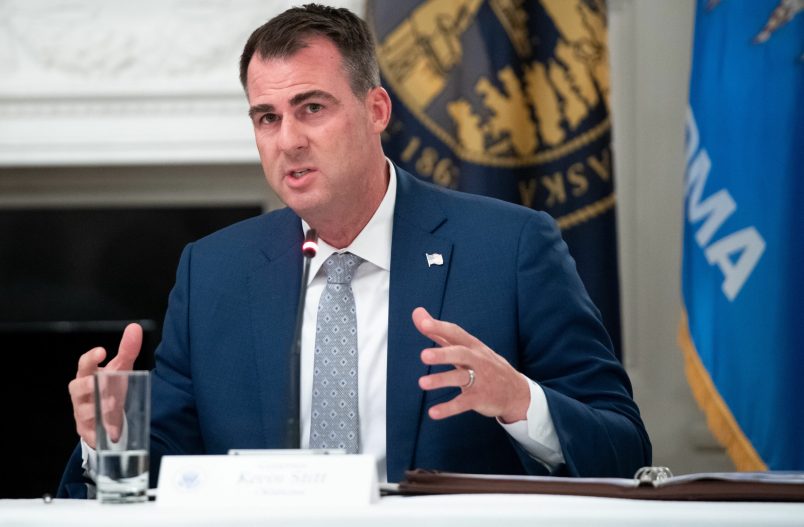Oklahoma Gov. Kevin Stitt (R) signed one of the nation’s most extreme abortion bans into law Tuesday morning, making it a felony to perform or attempt to perform an abortion in the state unless the pregnant person’s life is in danger.
“We want Oklahoma to be the most pro-life state in the country — we want to outlaw abortion in the state of Oklahoma,” Stitt said at the signing ceremony. “Attorney General John O’Connor and I know this bill will be challenged immediately by liberal activists from the coast, who always seem to want to come in and dictate and mandate and challenge our way of life here in the state of Oklahoma.”
The ban won’t go into effect until August when the state legislature adjourns, giving abortion advocates a brief window to put together legal challenges to the measure. It will likely become law weeks after the Supreme Court issues a ruling on Mississippi’s 15-week abortion ban, a challenge to federal precedent that conservative justices have already signaled they may use to overturn Roe v. Wade altogether.
“There’s a Mississippi law that’s now before the Supreme Court,” Stitt said. “These issues belong to the states.”
“We’re so excited about the Supreme Court addressing this issue and giving it back to the states where it belongs,” he added.
The Oklahoma ban is one of the most restrictive in the nation, as it bans the procedure entirely, regardless of how far along the pregnancy is. The law targets doctors and abortion providers instead of the patient, making the peformance of an abortion a felony, punishable by up to 10 years in prison and up to $100,000 in fines. An abortion can only be performed in the case of a medical emergency, with no exception for rape or incest.
The Oklahoma Senate passed the ban last year. The state House quietly shoved the bill through in a 70 to 14 vote earlier this month, catching abortion advocates by surprise and providers off-guard.
The timing of the draconian new law is no accident. Displaced patients from Texas, barred from abortion services in their own state thanks to the bounty hunter-style SB 8, have been spilling over the border into Oklahoma in search of care.
“We certainly don’t want Texans coming up to Oklahoma,” Stitt said. “That’s certainly not our intent, is to have Texans and other people from other states flood into our state to have abortions, so hopefully this bill will curb that.”
Oklahoma’s four abortion clinics have absorbed 45 percent of those Texans between September and December 2021, per a study from the University of Texas at Austin.
If the new Oklahoma law stands — and the conservative-majority Supreme Court has already displayed its willingness to let clearly-unconstitutional abortion bans stand even while Roe v. Wade is the law of the land — patients will have to travel even further to find abortion care.
Red states’ eagerness to pass a flurry of new legislation in anticipation of the Court’s expected overturning of Roe this summer offers a preview of the America to come: a bifurcated country where the availability of abortion healthcare depends solely on political control of the state. Pre-Roe abortion bans, similar to Oklahoma’s, are still on the books in more than a dozen states — and will once again go into force if Roe is overturned this summer.
But legal scholars are looking past even this coming divide to the next theater of war: interjurisdictional disputes, where red states prohibit their providers and patients from traveling elsewhere to provide or obtain services, and those other blue states protect the right to abortion within their borders.
“It’s always been the end game to make abortion inaccessible everywhere,” Jessie Hill, associate dean and professor at Case Western Reserve University School of Law, told TPM.



